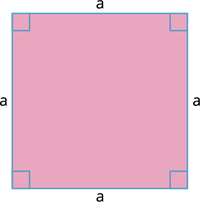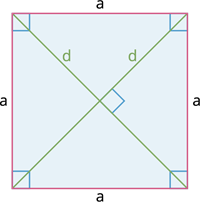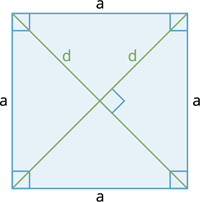PDF chapter test TRY NOW
Area of a square: The area of the square is the product (multiply) of the length of its sides.

Area = side × side.
Area (A) = a × a = a² square units or A = a² or a² = A or a = √A
Where a denotes the side of the square.
Side of the square = P/4 units.
Side of the square = P/4 units.
For, diagonals area of square = 1/2(d²)
The perimeter of a square: The perimeter of a square is the sum of the length of its sides.

The perimeter (p) = AB + BC + CD + DA or p = (a + a + a + a) = 4a units.
Where a denotes the length of each side of a square.
(Note: The perimeter is equal to the sum of all sides).
Diagonals of a square: Diagonals of a square are equal in length, they bisect the angles, and they are the perpendicular bisectors of each other.

Length of the diagonal d = √(a² + a²) = √(2a²^2) = a√2 units.
Where d denotes a diagonal of a square is equal to side length times square root of 2.
